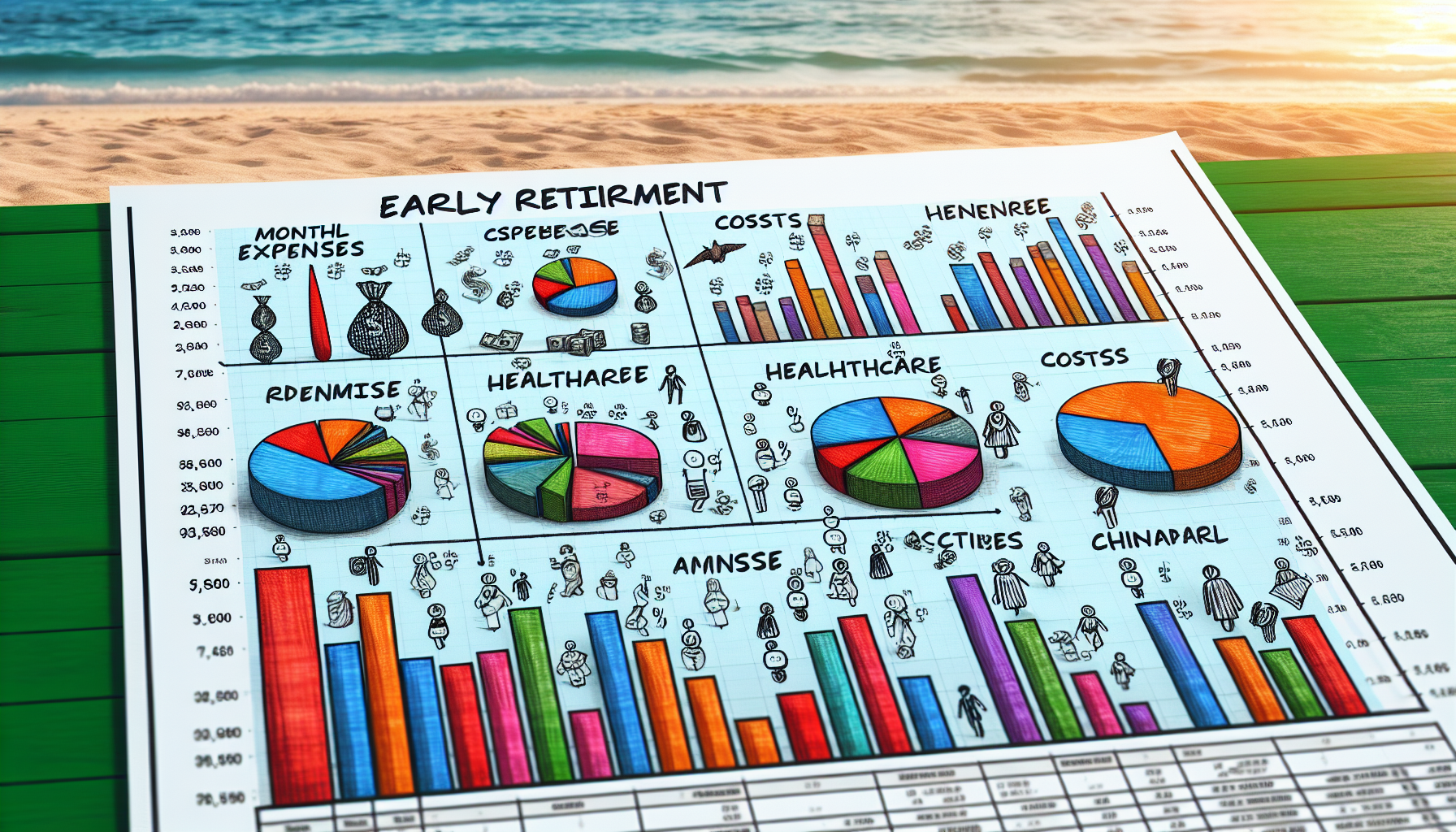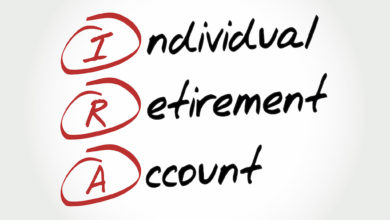Early Retirement Essentials: Your Strategic Plan to Achieve Financial Freedom Sooner

“Financial peace isn’t the acquisition of stuff. It’s learning to live on less than you make so you can give money back and have money to invest. You can’t win until you do this.” – Dave Ramsey
Achieving early retirement and living your dream of sipping an icy beverage on a sunny beach doesn’t have to be wishful thinking. With careful planning and dedicated saving habits, you can make this fantasy come true! Think about having the freedom to explore all of your passions while still spending quality time with those close to you. Or, finally launching that project that has been brewing in your mind for ages now is possible if taking action today is at the forefront. This post will take readers through every step needed when embarking upon their exciting journey towards retiring early, starting from setting objectives and continuing until eventual success.
Key Takeaways
- Visualize your early retirement lifestyle and set goals to make it a reality.
- Utilize smart investment strategies, diversify income streams & take advantage of employer match programs for maximum savings potential.
- Partner with a financial advisor to plan healthcare before Medicare, optimize investments & prepare for the unexpected!
Envisioning Your Early Retirement
If you aspire for a life of leisure and exploration in your long retirement, the first step is to imagine what it could look like. This involves more than just deciding when to retire. Rather, developing an ideal lifestyle that can be sustained financially throughout its entirety. At this stage, one needs to set goals for their retirement age ahead of full retirement age as well as evaluate any pros/cons associated with retiring early compared to later on down the line.
Setting Retirement Milestones
Retirement plans can be visualized with the help of milestones. These signposts enable people to track their path towards early retirement more easily and effectively. Examples include saving a specific amount by a certain age, making maximum contributions to retirement accounts, or deciding when it is time for income from savings withdrawals.
In order to stay on course while taking charge of financial matters, these targets should be set wisely, considering one’s desired goals in mind so that all pieces come together perfectly: social security benefits, too, are part of this larger puzzle as they form an integral component of total assets for retirees at large – determining cash flow during post-retirement life significantly.
Considering your personal situation carefully before planning out attainable objectives will guide you through attaining secure funds once you reach advanced years since Social Security helps bridge the gap between saved money and required payments after ceasing employment altogether later down the line!
Understanding Full Retirement Age vs. Early Retirement

Reaching financial independence starts by understanding the difference between a full retirement age and an early retirement. According to the Social Security Administration, this usually falls between 66 and 67 years old [1]. With a head start on your timeline, it can be advantageous, albeit at reduced social security benefits. A financial planner can help you calculate the best course of action for achieving prosperity through the determination of income when retiring earlier or later than planned.
Pros and Cons of Early Retirement
Retirement before the traditional age can come with many rewards, yet it is important to take into account all potential challenges. Through mindful considerations and thoughtful financial planning, one may still reap the benefits of having an extended period for leisure activities such as enjoying hobbies or visiting distant places while dealing with eventualities like providing medical care until Medicare eligibility kicks in. With careful preparation, early retirement could be a satisfying decision.
Crafting Your Early Retirement Budget

Developing a budget is an essential step to retiring early, as it acts like a financial guide for the years ahead. To make this possible, you will need to estimate your monthly expenses and adjust them according to changes during retirement life. Here are some ways of achieving this:
When creating your early retirement plan’s budget, consider what costs may come up each month and adapt these accordingly so that they fit with the lifestyle planned in retirement. It’s important not only when saving money but also managing those funds throughout retirement life.
Projecting Monthly Expenses
Also, when planning for your retirement, it is important to calculate what amount of income you will need. This includes estimating how much money needs to be spent each month and taking into account inflation over time. Analyzing current spending habits and predicting possible changes in the future due to different activities such as hobbies or healthcare should also be factored in when creating a budget.
Once an estimate has been made on monthly expenses, this figure gives a better indication of exactly how much money is necessary each month during retirement years so that adequate plans can then be put into place regarding monthly income sources.
Anticipating Changes in Spending Patterns
Retirement necessitates a lifestyle transformation, meaning that your expenses will shift as well. To create an accurate yet adjustable retirement budget, here are the primary matters to take into consideration.
- With work out of the equation, you may spend less money but more on recreational activities and hobbies instead.
- Healthcare costs can be expected to increase with age, so it’s important to plan for those, too, if possible [2].
- Last but not least, any traveling plans should also be factored in when allocating funds in preparation for retirement.
Building a Robust Retirement Savings Plan

With your retirement dreams in sight and a budget made, it’s time to develop an effective saving strategy for the future. This plan is what will drive you towards that goal of early retirement. This means investing as much money as possible into relevant accounts like 401Ks or IRAs, taking advantage of company match programs, and making smart investment decisions.
In order to make sure we move forward with all options available, let us delve deeper into these possibilities so we can ensure ourselves financial stability later on.
Maximizing Contributions to Retirement Accounts
Maximizing contributions to retirement plans such as 401(k)s and IRAs is an effective strategy for increasing the amount of money saved up by the time you retire. You can contribute a maximum of $22,500 towards your 401(k) in 2023 and put away no more than $6,500 into either traditional or Roth IRAs that year [3]. Taking advantage of these limits will allow your savings to grow significantly due to compounded growth over a period. With each additional contribution, like rolling a snowball through snow, it becomes larger!
Seeking Free Money Through Employer Match
Don’t miss out on the free money your employer can provide by matching 401(k) contributions. It’s like a part of your income, and with such an arrangement, you could considerably increase your retirement savings over time. For instance, if they match up to 6% of salary at 50%, that would mean $1,800 more each year for somebody earning $60K – compounded interest will generate even more! This adds substantial amounts of long-term retirement security.
Investment Strategies for Early Retirement

For those looking to retire earlier than average, diversification of income streams and an investment portfolio built for maximum returns with minimal risk are essential. Utilizing a brokerage account provides flexibility when making investments, as it offers access to various options in one place. It’s also beneficial to make your money work for you by ensuring that each dollar is invested wisely toward the goal of early retirement.
Finally, stay vigilant and on top of all decisions being made – understanding where every cent goes will ensure steady progress toward achieving financial freedom before anticipated years into adulthood usually come around!
Diversifying Income Streams
Diversifying your income streams is akin to planting a variety of seeds in the garden. Different types of investments can grow at different rates, provide various returns such as dividends, and even withstand market fluctuations more reliably, making diversification an excellent way to mitigate risk while increasing potential profits.
When considering sources for extra revenue, there are many options available, including stocks that give dividends, bonds offering interest, rental properties that produce regular income, or potentially starting up a side business altogether.
Considering a Brokerage Account for Flexibility
Investment accounts, often known as brokerage accounts, are like a financial toolkit that provides early retirees and other investors with the liberty to select from an extensive range of investment solutions such as stocks, bonds, mutual funds, or ETFs. Unlike retirement plans, there is no penalty for those who need access to their investments prior to reaching traditional retirement age.
The flexibility offered by these kinds of accounts might be especially beneficial for people choosing to retire earlier than usual who could take advantage before it’s too late. To make sure you can use your money wisely during this period, one should consider investing in good quality savings through investment accounts instead of relying solely on individual retirement funds where withdrawals may have serious consequences attached.
Planning for Healthcare Before Medicare

For those hoping to retire at a young age, health insurance is an essential factor in the decision-making process. This is due to the fact that Medicare does not cover individuals who are under 65 and retire early. Retirees need another form of medical coverage until they meet the eligibility requirements for Medicare.
Those looking towards retiring before their retirement age should research healthcare costs while finding alternate solutions when it comes to obtaining healthcare during this period, such as alternative insurance policies or strategies for covering expenses related to personal well-being.
Partnering with a Certified Financial Planner
Achieving retirement goals can be a tricky endeavor that involves understanding and navigating through financial terminology. That is why enlisting the help of a certified financial planner, who acts like your very own personal coach when it comes to planning for early retirement, makes life much easier. They are able to advise you on any decisions regarding your path toward retirement in order for you to reach these desired objectives with no hassle at all!
Taking this into account even reveals how beneficial it can really be having them by our side during such an important process as retiring ahead of time – they give us support while helping us make well-informed choices along the way so we don’t veer off course from achieving those lifetime targets related to pension funds.
The Role of a Financial Advisor
A financial advisor is like a compass for your early retirement journey, helping you achieve the destination of long-term security. They create customized investment strategies that align with both your risk tolerance and objectives pertaining to retirement so that all available income streams can be managed optimally while also taking advantage of any tax-efficient savings opportunities. In this way, they help guide and ensure that successful outcomes are achieved on the path towards an earlier exit from work life than usual!
How an Advisor Can Help with Tax Planning
A financial advisor can provide beneficial assistance to ensure you keep more of your retirement savings. Planning for taxes is an essential part of securing a successful retirement, and they are able to suggest ways to optimize investments, minimize tax burdens when retired, and advise on funding Roth accounts during the earlier stages of employment. Utilizing specific techniques such as managing income taxes strategically along with investing in different types of tax-advantaged retirement accounts will aid immensely in achieving objectives set out for early retirement goals faster than originally planned.
Preparing for the Unexpected
Planning for the future and retirement is important, as life’s unpredictability can throw a wrench into those plans. To cover sudden costs that arise without draining your savings, an emergency fund should be established to act as a financial buffer during trying times. This kind of early retirement planning provides security in case any unexpected expenses need to be met down the line, such as medical bills or home repairs.
Transitioning from Full-Time Work
Transitioning to retirement can often be a major lifestyle shift. It’s not just about leaving your job but embracing this new phase of life at its own pace. To make the process easier and enjoyable, here are some suggestions.
Firstly, take things slow as you adjust to different rhythms, gradually changing habits and attitude may help in making the move smoother. Secondly, try coming up with activities that will fill out days while providing enjoyment. This could include engaging in hobbies or volunteer work, which keeps an individual busy throughout their newfound free time after retiring from full-time employment.
Achieving Debt Freedom
Reaching debt-free status before retirement is something to be desired. To reach that goal, one must create a plan and prioritize debts with the highest interest rates, then stay focused on becoming financially free of any obligations. Doing so will ultimately lead you towards enjoying early retirement without having to worry about monthly payments or other financial concerns. Becoming debt-free allows for more freedom when it comes time for saving and investing in order to build up your nest egg even During those golden years ahead!
The Institute of Financial Wellness
The Institute of Financial Wellness is the ideal partner to help you reach early retirement. We provide an extensive system for financial education, resources, and services so that one can become financially secure. Our organization offers personalized programs along with support in person when it comes to planning your future after retirement. With our help, you will be able to devise a plan that helps achieve freedom from debt earlier and reinforce long-term stability.
The Retirement Score: A Tool for Confident Retirement Planning
The Retirement Score is a unique tool that can help you determine the probability of achieving your income goals during retirement and living your best life after retirement. This tool serves as a reality check for your future, allowing you to confidently plan for your retirement and avoid leaving it to chance. The Retirement Score is a patent-pending tool that you can use to ensure that you are on the right track to achieving your retirement goals.
This tool is an excellent option for those who wish to lower or even eliminate taxes after retirement, safeguard their portfolio from market volatility, and maximize their retirement income. By analyzing your current retirement savings, retirement age, and future rates of return, the IFW Retirement Score can provide valuable insights into your retirement success. With this tool, you can make informed decisions about your retirement savings, retirement accounts, and investment strategy. Moreover, it considers social security benefits and tax-advantaged retirement accounts to give you a comprehensive view of your retirement income, ensuring that you have all the necessary information to plan your retirement effectively.
Full Summary
Ultimately, achieving early retirement is attainable with thoughtful planning, budgeting, and investments. Consider creating benchmarks to track progress or diversifying income sources to prepare for financial independence. Saving money regularly will be essential on the path toward realizing your goal of retiring before most others do, so get started right away!
Frequently Asked Questions
What qualifies you to retire early?
Retiring early can be defined as retiring before age 62, which is when you first qualify for reduced Social Security benefits or before your Medicare eligibility age, depending on when you were born.
Starting to receive benefits after the normal retirement age may result in larger benefits, with delayed retirement credits potentially allowing for the largest benefit if retired at age 70.
Can you legally retire at 55?
You can officially retire as early as 55, and some individuals even plan to do so before 40. It is essential to think about the accepted retirement age along with things like leaving your job when it comes time for you to retire in order to have access to Social Security or take out money from a 401(k) without penalty.
What is a good age for early retirement?
Retirement before the age of 65 is attainable and rewarding – on average, men retire at 64, while women tend to do so a bit earlier, usually by 62. It can be an incredible opportunity to live life fully outside of your career, so it might be worth aiming for this milestone when possible!
What do the happiest retirees do?
Maintaining a healthy lifestyle is key to having an enjoyable retirement. Low-cost forms of exercise like walking, swimming, biking, and hiking can all be beneficial in helping one enjoy the years after work! Taking good care of your physical health will go a long way in ensuring you have an invigorating retirement experience.
What is the fastest way to retire early?
Gain mastery over your finances by examining your investments, paying off loans, and calculating what you will need for retirement. Make the most of contributions to a retirement fund while formulating a well-considered savings and investment program – with this plan in place, it’s possible to retire earlier than anticipated!
After 18 years as President and Founder of TheaterMania and OvationTix, Darren is excited to be on a new journey as the President and Co-Founder of The Institute of Financial Wellness. (The IFW)
For consumers, The IFW provides financial education, resources, and services that help people live their best life.
For Financial Professionals, The IFW provides proven sales and marketing systems, state-of-the-art technology, training, and support to financial professionals nationwide. The IFW helps financial professionals grow their practices to the next level! IFW Certified Financial Professionals are an elite group of professionals that, together with the IFW, help people succeed financially and live their best lives.






